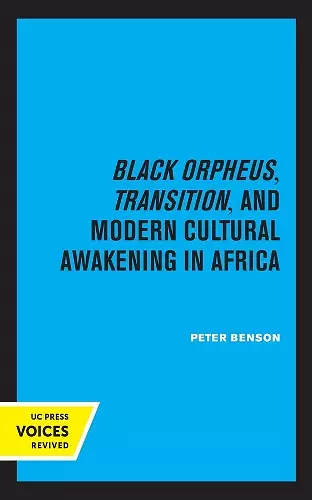Black Orpheus, Transition, and Modern Cultural Awakening in Africa
Format:Hardback
Publisher:University of California Press
Published:11th May '23
£80.00
Supplier delay - available to order, but may take longer than usual.

Black Orpheus and Transition stand as towering landmarks in Africa’s cultural and intellectual history between 1957 and 1978, serving as incubators for the continent's postcolonial literary and artistic awakening. Founded in 1957 by Ulli Beier in Nigeria, Black Orpheus was a platform for artistic experimentation and dialogue, initially inspired by the Paris-based Présence Africaine but quickly evolving into its own distinctive voice. Beier’s initiatives, such as the Mbari Clubs in Ibadan and Oshogbo, complemented the magazine’s mission, offering creative spaces that nurtured some of Africa’s most notable artists and writers. By 1961, Transition, founded in Uganda by Rajat Neogy, emerged as a dynamic forum for cultural redefinition and incisive political commentary. Both publications became indispensable for grappling with the intellectual and cultural challenges of decolonization, exploring themes ranging from African aesthetics to the politics of independence.
Despite their profound influence, neither magazine enjoyed smooth trajectories. Black Orpheus weathered internal upheavals, with a second editorial generation—led by Abiola Irele and J.P. Clark—taking the reins and redefining its vision. Meanwhile, Transition faced outright suppression when Neogy was imprisoned for sedition in Uganda. Relocating to Ghana under the stewardship of Wole Soyinka, the magazine continued to thrive, but both journals struggled to adapt to Africa’s rapidly evolving post-independence realities. Their pages reflected a rich tapestry of debates: pan-Africanism versus tribalism, artistic primitivism versus modernism, and indigenous languages versus Western literary conventions. Ultimately, these magazines were more than periodicals—they were crucibles of creativity and intellectual exchange that catalyzed a generation of thinkers and writers. While their eventual closures were due to economic and logistical challenges, their legacy as formative platforms for Africa’s modern cultural identity remains unparalleled.
This title is part of UC Press's Voices Revived program, which commemorates University of California Press’s mission to seek out and cultivate the brightest minds and give them voice, reach, and impact. Drawing on a backlist dating to 1893, Voices Revived makes high-quality, peer-reviewed scholarship accessible once again using print-on-demand technology. This title was originally published in 1986.
ISBN: 9780520369764
Dimensions: 234mm x 156mm x 23mm
Weight: 635g
338 pages